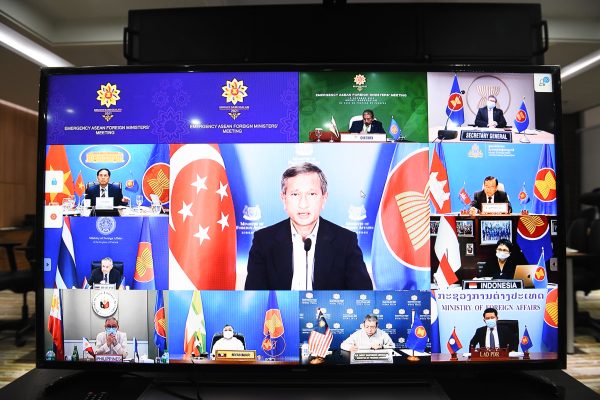
Myanmar’s military-installed government has challenged the decision of the Association of Southeast Asian Nations (ASEAN) to bar its self-appointed leader from attending the regional bloc’s summit this week.
At a “tense” emergency meeting on October 15, ASEAN’s foreign ministers decided to uninvite coup leader Sen. Gen. Min Aung Hlaing from the summit, which is set to open tomorrow and will kick off three days of summits and side-meetings.
Current ASEAN chair Brunei said the decision was made due to the junta’s lack of cooperation on the implementation of ASEAN’s Five-Point Consensus agreed at a special ASEAN meeting in April, the consensus included ending violence, initiating dialogue with “all parties,” and granting a special envoy full access to the country.
Instead, Brunei has invited a “non-political representative” from Myanmar to the summit, which will be held via video link due to the COVID-19 pandemic. It will be followed by other meetings including the East Asia Summit, which will also include leaders from Japan, Russia, Australia, China, India, and the United States.
The exclusion of Min Aung Hlaing from these meetings is an important symbolic victory for the opposition National Unity Government (NUG), which is competing with the junta for international recognition. It was important in that it formally acknowledged the NUG’s claim to be the legitimate government of Myanmar, even if it is yet to openly support it. As Aaron Connelly of Singapore’s International Institute for Strategic Studies argued in an article last week, the decision marked “the NUG’s most significant diplomatic victory to date, and will boost its chances of recognition.”
It was also a relatively drastic decision from Myanmar, given the tight constraints imposed by the ASEAN’s founding principles of consensus-based decision making and non-interference in the affairs of its 10 member states. After initially appearing to have taken ASEAN’s decision on the chin, the junta’s foreign ministry said in a statement Friday that its disinvitation of Min Aung Hlaing violated these very principles.
“Myanmar will not be in a position to accept any outcome of the discussions and decisions which are… contrary to the provisions, objectives and cherished principles of the ASEAN Charter,” the statement said, according to Reuters. It added that only a full summit of ASEAN, presumably including the Myanmar junta, could consider whether to bar the attendance of a member nation’s leader.
At the same time, Myanmar’s junta continues to claim that its supporting the Five-Point Consensus. In an announcement in state media yesterday, the junta said that it would cooperate “as much as possible” with ASEAN’s plan. This was undermined by its remark that it would also press ahead with its own five-point plan for restoring “democracy,” which given that it seems to involve the defeat of the anti-coup resistance by force of arms followed by the erection of some sort of electoral façade, directly contradicts ASEAN’s process.
It remains unclear if the junta’s complaint about Min Aung Hlaing’s exclusion from the summit implies some sort of more robust form of protest. A day out, it also remains unclear who, if anyone, will represent Myanmar at the summit. (There is virtually no one who the junta could send to the summit who could be as “non-political,” especially by the NUG.)
However, the reaction suggests that the junta is responding to ASEAN’s temporarily more robust position by hardening its own. It is hard to know how the Southeast Asian bloc’s position will develop from here, and whether this summit exclusion marks the beginning or the end of a more robust approach to the crisis in Myanmar.
If the former, the prospect of more drastic pushback from the Myanmar military can’t entirely be ruled out. As Andrew Selth of Griffith University noted in a recent article, the Myanmar military was always divided on whether or not to join ASEAN in 1997, with some prominent commanders concerned that even with its commitment to “non-interference,” membership might compromise the country’s freedom of maneuver and tradition of foreign policy neutralism.
Given this history, if ASEAN continues to increase its pressure on the junta, it is not inconceivable that the junta could drag Myanmar toward the exit, or threaten to do so. “If the association appears to have turned against it,” Selth concluded, “then it is possible that the generals will come to the conclusion that they can live without it.”
Myanmar Junta Decries Exclusion of Coup Leader From ASEAN Summit
Source: Frappler

0 Comments